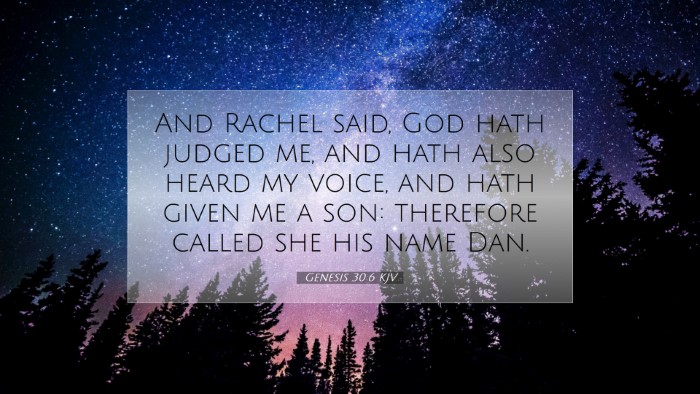Commentary on Genesis 30:6
Verse Text: "And Rachel said, God hath judged me, and hath also heard my voice, and hath given me a son: therefore, called she his name Dan."
Overview
Genesis 30:6 captures a significant moment in the life of Rachel, Jacob’s beloved wife, who had endured years of barrenness. In this verse, Rachel acknowledges God's intervention in granting her a son through her maidservant Bilhah. This passage not only reveals Rachel's emotional struggle but also highlights the themes of faith, divine judgment, and human agency in the fulfillment of God's promises.
Commentary Insights
Matthew Henry's Commentary
Matthew Henry reflects on Rachel's declaration of God's justice in her situation. He notes that Rachel felt judged by God for her inability to bear children. Upon receiving Dan, she recognizes that God has heard her cry and has rendered justice by giving her a son. Henry emphasizes the importance of interpreting life’s circumstances as God’s answers to our prayers and reminds readers of the value of patience in waiting for God's timing.
Albert Barnes' Notes on the Bible
Albert Barnes provides a detailed analysis of the name "Dan," which means “judged.” He interprets Rachel's words as a reflection of her struggle to find favor in God's sight. Barnes points out that the blessing of a son signifies God's favor and justice but also denotes the complex dynamics within Rachel and Leah’s rivalry. He also highlights the nature of covenant blessings where God favors His people with offspring as evidence of His promises being fulfilled.
Adam Clarke's Commentary
Adam Clarke delves into the cultural context surrounding childbearing in ancient times. He explains that for women like Rachel, the inability to bear children was seen as a significant social stigma. Clarke further remarks on the act of Rachel giving her maid to Jacob, a practice common in the culture at that time, to bear children in her stead. He indicates that Rachel’s actions were driven by desperation and societal pressure and illustrates the lengths to which she would go to secure a legacy through her children.
Theological Implications
- Divine Sovereignty: This verse highlights God's authority over life and fertility. The birth of Dan emphasizes that God is the ultimate giver of life and should be worshiped for His providential care.
- Human Agency: Rachel’s use of Bilhah as a surrogate speaks to human attempts to fulfill divine promises through human means. This raises questions about faith and the methods employed in seeking God's blessings.
- Justice and Judgment: Rachel’s naming of her son signifies her belief that God has not only given her a child but has also vindicated her in a judgmental society. This dimension holds particular relevance for contemporary discussions of justice and God’s outreach to the marginalized.
Applications for Today
This passage offers rich insights for pastors, students, theologians, and Bible scholars. It invites reflection on how contemporary believers react to circumstances that feel unjust or unfaithful. The dialogue between human agency and divine providence is pertinent for those wrestling with issues of destinies and life circumstances.
Believers are encouraged to embrace a posture of prayer and supplication, recognizing that God is attuned to their struggles, just as He heard Rachel’s cries. The commentary on Genesis 30:6 implores individuals to trust in God’s timeline and foster patience, knowing that justice and blessings will ultimately manifest according to His plan.
Conclusion
Genesis 30:6 serves as a profound reminder of God's faithfulness and the complexities of human relationships before Him. Understanding Rachel's journey through this lens enriches our comprehension of Scripture and its application to our lives today. Each perspective provides a layered understanding of the character of God, the struggles of His people, and the unfolding of His redemptive plan.


